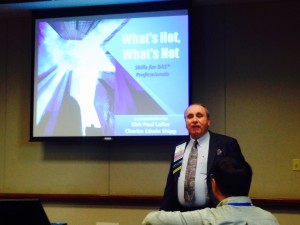 Good news SAS users; you are a hot commodity. That’s the primary message Kirk Paul Lafler from Software Intelligence Corporation and Charlie Shipp of Consider Consulting Corporation delivered to a room full of users at MWSUG 2015.
Good news SAS users; you are a hot commodity. That’s the primary message Kirk Paul Lafler from Software Intelligence Corporation and Charlie Shipp of Consider Consulting Corporation delivered to a room full of users at MWSUG 2015.
Citing figures from the Bureau of Labor Statistics and a recent CNN Money report, Lafler highlighted the value of SAS knowledge and noted a rising demand for individuals with SAS proficiency. According to the sources, SAS programmers can expect an average salary in excess of $90,000 a year with a projected growth rate that tops 22%.
“When I got out of college I was making what is now less than minimum wage and I was glad to get that offer,” Lafler said. “Now, individuals with analytical skills are getting internships for salaries that make me drool.”
Big data offers even bigger opportunities. With all the buzz around data science and demand for individuals with analytical skills outpacing supply, Lafler said big data is one of the “hot” skills for today’s SAS professionals. But it’s far from the only growth area.
Lafler encouraged SAS users to learn more about SAS Structural Graphics, Hash Objects, ODS, and Metadata. “Learn as much as you can about metadata,” Lafler recommends. “As the world collects more data, metadata is becoming more important. Become familiar with metadata, dictionary tables and SASHELP views.”
If you want to learn SAS, Lafler says the SAS OnDemand for Academics makes it easy. "If your parents or children want to learn more about SAS or what you do, they no longer have an excuse. Have them download SAS software and start learning. The only restriction, it has to be used for learning only.”
If you're looking to advance your existing career, Lafler encourages you to invest in yourself. Becoming certified will differentiate you from other analytical professionals. “Don’t be afraid of SAS’ certification exams. Access SAS OnDemand for Academics and purchase the Certification Prep Guide. I’m a terrible test taker. If I can do it, anybody can do it. You’ll learn so much by preparing for an exam.”
Lafler said SAS has great resources to help you expand your expertise. His recommendations include:
- Use free SAS OnDemand for Academics software
- Courses, workshops, presentations
- Self-paced e-learning
- Tech Support at support.sas.com
- Online SAS documentation
- User-written books
- Published white papers on LexJansen.com
- Collaborate/Network with other SAS users
Lafler also offers a proven, step-by-step roadmap to help you in your pursuit of career excellence. To assist in getting started, Lafler and Shipp offer a self-survey questionnaire to help you assess where you are and the skills needed to achieve your goals.
The process is easy:
Step 1: Identify the skills you currently possess.
Step 2: Rank each skill (e.g., 4=Expert, 3=Proficient, 2=Some Working Knowledge, 1=Heard of it, 0=None).
Step 3: Identify your level of competence (e.g., 3=Cutting Edge, 2=Competitive, 1=Out-of-date, 0=None).
Step 4: Categorize each skill by functional discipline (e.g., programming, design, analysis, teaching, consulting, marketing, etc.)
The resulting matrix will help you determine what skills you’d like to pursue. Armed with this knowledge you can create a plan to improve your skills, and build your expertise.
Despite his glowing report Lafler had some final words of advice that went beyond SAS or the world of analytics. Develop a passion for your chosen field and become dedicated to something greater than oneself. “My father shared this bit of wisdom that I’ll now share with you. Love what you do. When you love what you do, you’ll never work a day in your life.”
